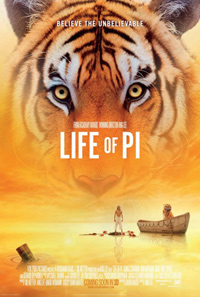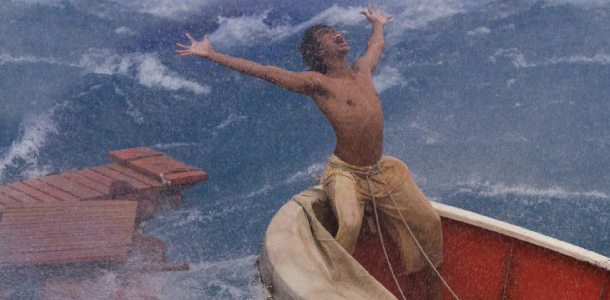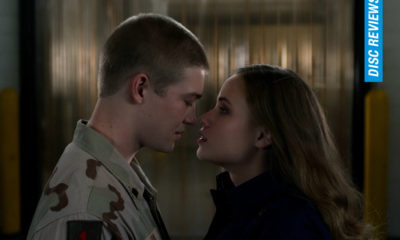Reviews
Life of Pi | Review
Bengali Buoyancy: CGI impresses, but story falls short in Ang Lee’s adventure
 The highlight of Ang Lee’s 3D, CGI-laden adrift-at-sea fantasy film Life of Pi might be the long, leisurely opening credit-sequence montage of animals at a zoo — bizarre creatures behaving beautifully, symptoms of some Creator’s inspired, peculiar, inscrutable pathology. The presence of the metaphysical, or divine, is more keen here than in anything else that follows in Lee’s technically impressive but over-slick ‘Pi,’ which purports to be a spiritually aware journey of tragedy, deprivation, and redemption, but ultimately folds under the weight of confused allegory, sound byte theology (“Science teaches us what is out there,” we are patronizingly lectured, “religion teaches us what is in here”), and a central character who, despite his many weepy scenes, is more a writer’s concept than a human being.
The highlight of Ang Lee’s 3D, CGI-laden adrift-at-sea fantasy film Life of Pi might be the long, leisurely opening credit-sequence montage of animals at a zoo — bizarre creatures behaving beautifully, symptoms of some Creator’s inspired, peculiar, inscrutable pathology. The presence of the metaphysical, or divine, is more keen here than in anything else that follows in Lee’s technically impressive but over-slick ‘Pi,’ which purports to be a spiritually aware journey of tragedy, deprivation, and redemption, but ultimately folds under the weight of confused allegory, sound byte theology (“Science teaches us what is out there,” we are patronizingly lectured, “religion teaches us what is in here”), and a central character who, despite his many weepy scenes, is more a writer’s concept than a human being.
A floundering white novelist (a depthless Rafe Spall) is tipped off that he might have a subject for a book in an Indian man named Pi, who apparently has a story to tell so astounding that it will bring about a religious conversion. To which religion you will be converted is not clear, as Pi (in older embodiment, played by the great Irrfan Khan; transfixing as “Sunil” in ‘In Treatment,’ he gives it his best here, but is under-used) recounts his youthful devotion to — and Cliff’s Notes versions of — all the world’s major religions. Pi is a Hindu-Buddhist-Christian-Arab, stirred with a Kabbalah twist. Why not a mint twig of Scientology? The film even makes sure to give “rationality” its place in the constellation of faiths. Lee is not nailing his 95 Theses to the movie screen. This calculated universality is not the result of a rigorous philosophy of comparative religion, but only a marketing strategy seeking to swarm multiple demographics.
Pi recounts his coming-of-age story, the centerpiece of which is the wreck of a cargo ship carrying zoo animals, of which he is the only human survivor, and after which he winds up lost in the middle of the Pacific on a lifeboat with a vicious Bengal Tiger named Richard Parker. The CGI creation of this tiger is virtuosic and remarkably life-like, a hopeful harbinger of cinema’s future possibilities. And Lee, as usual, orchestrates numerous sequences — including a stormy shipwreck, an assault from flying fish, and a sojourn on an island that is one large “Venus flytrap” ecology — with his usual artfulness and craft, his equal attention to sense and sensibility.
But it’s not nearly enough. Lee is in desperate need here for frequent collaborator James Schamus’ narrative shrewdness and psychological insight. Screenwriter Schamus would never settle for the pre-fabricated wisdom chewables that the ‘Pi’ screenplay, written by David Magee, from the novel by Yann Martel, settles for. Nor would he likely have suffered its tidy conclusions about the value of storytelling, which swell so far in hubris as to flabbergastingly presume the intentions of God Himself.
Martin Scorsese’s masterful foray into 3D, ‘Hugo,’ worked not only because of his breathtaking cinematic orchestrations, but because of the real and powerful emotions anchoring the story at every turn. It is this emotional anchor that Lee’s film is sorely missing, no matter how many teary speeches there are, or how many times, with a simmering sense of inadequacy, Life of Pi tries too hard to convince us about how “amazing” its story is.
Reviewed on September 30th at the 2012 New York Film Festival – (opening night)
125 Mins.

































